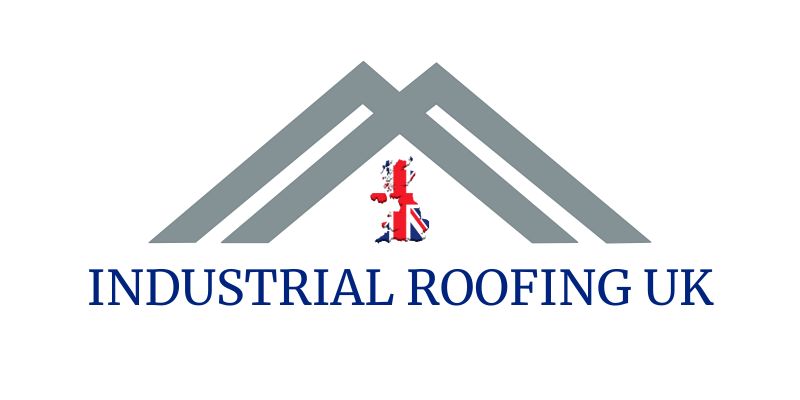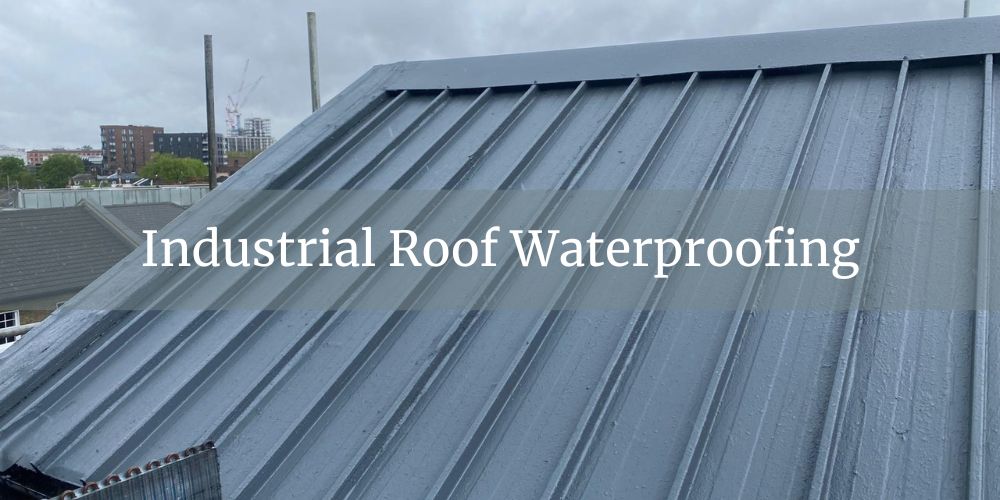Industrial roof waterproofing involves applying protective layers and treatments to the roofs of industrial buildings to prevent water ingress. This process is essential for preserving the roof's structural integrity and safeguarding the building's contents from water damage. Typically, it includes cleaning the roof, fixing any damage, and applying robust waterproof coatings such as liquid polyurethane. Effective waterproofing reduces the risk of leaks and corrosion, extending the roof's lifespan and improving energy efficiency.
Industrial Roofing UK offers professional industrial roof waterproofing services across the UK, protecting large-scale facilities from water ingress and weather-related damage. We apply advanced waterproofing systems, this including; liquid coatings, membranes, and overlays. The waterproof coatings can be applied to metal, flat, and composite roofs. These specialist waterproof roof coatings ensuring long-lasting resistance against rain, standing water, and moisture penetration. The solutions provide by Industrial Roofing UK are ideal for warehouses, factories, and processing plants, particularly in areas prone to leaks, ageing materials, or complex roof details. With nationwide coverage and minimal disruption to your operations, we deliver high-performance waterproofing tailored to industrial environments and compliance requirements.
What Is Industrial Roof Waterproofing?
Industrial roof waterproofing involves applying protective layers and treatments to the roofs of industrial buildings like factories, warehouses, and manufacturing plants to prevent water ingress. This process is essential for maintaining the structural integrity and longevity of the roof, protecting the building's contents and machinery from water damage. According to the National Federation of Roofing Contractors (NFRC), effective waterproofing is crucial for industrial roofs exposed to harsh weather conditions.
The waterproofing process typically includes cleaning the roof surface, repairing any existing damage, and applying high-quality waterproof coatings such as liquid polyurethane or bituminous membranes. The Building Research Establishment (BRE) notes these materials provide a seamless, durable barrier against water penetration, significantly reducing the risk of leaks and corrosion. Studies indicate a well-maintained waterproofing system can extend the life of an industrial roof by up to 50%, resulting in substantial cost savings on repairs and maintenance (RCMA).
Investing in industrial roof waterproofing enhances the durability of the roofing system and improves energy efficiency by maintaining proper insulation. This proactive approach ensures the building remains secure and operational, even under adverse weather conditions, thereby supporting the overall productivity and safety of the industrial facility. By keeping the roof in optimal condition, companies can avoid costly downtime and ensure the protection of their assets.
Have a question about an upcoming project?
What Is The Best Way To Waterproof An Industrial Roof?
The best way to waterproof an industrial roof is by using liquid-applied membranes, such as liquid polyurethane, due to their seamless and flexible nature. These coatings create a continuous barrier preventing water ingress and can adapt to the roof's movements. Additionally, incorporating top-quality materials like EPDM or bituminous coatings can enhance resilience and weather resistance. According to the British Coatings Federation, using premium waterproofing solutions can extend the roof's lifespan by up to 20 years, making it a cost-effective choice for long-term protection. Regular maintenance and inspections are also crucial to ensure the waterproofing remains effective over time.
What Are The Best Coatings for Industrial Roof Waterproofing?
The best coatings for industrial roof waterproofing include polyurea, polyurethane, silicone, elastomeric, and acrylic coatings. These coatings are essential for protecting metal roofs, extending their lifespan, enhancing durability, and improving energy efficiency. They provide a shield against environmental factors such as UV rays, water, chemicals, and temperature extremes, making them crucial for maintaining the integrity of industrial buildings.
The different types of industrial roof coatings are:
- Polyurea Coatings
- Polyurethane Coatings
- Silicone Coatings
- Elastomeric Coatings
- Acrylic Coatings
1. Polyurea Coatings
Polyurea coatings are known for their exceptional toughness, rapid curing time, superb chemical resistance, and high flexibility. They provide a seamless, resilient, and waterproof barrier, making them ideal for industrial metal roofs. Polyurea coatings withstand harsh environmental conditions and heavy mechanical stress, offering long-lasting protection in the UK climate. These coatings can elongate up to 400%, ensuring excellent adaptability to roof movement.
2. Polyurethane Coatings
Recognised for their high abrasion resistance and robustness, polyurethane coatings are suitable for metal roofs in industrial settings. They come in two primary types: aromatic (less UV resistant, used as a base coat) and aliphatic (highly UV resistant, used as a top coat). Polyurethane coatings are perfect for areas with heavy foot traffic or mechanical equipment, providing a sturdy protective layer for metal roofs in the UK. Their high UV resistance is crucial for protecting roofs from solar damage.
3. Silicone Coatings
Silicone coatings are solvent-based and highly effective in resisting ponding water, UV rays, and extreme weather conditions. They offer superior longevity and flexibility, making them ideal for metal roofs experiencing significant movement. In the UK, silicone coatings are popular for their enduring performance and ability to withstand harsh weather. Their reflectivity can reduce energy costs by up to 35%, improving overall building energy efficiency.
4. Elastomeric Coatings
Elastomeric coatings are flexible and stretchable, providing a seamless and durable waterproof barrier. Made from various polymers, including acrylic and silicone, these coatings effectively bridge small cracks and accommodate roof movement. In the UK, elastomeric coatings are suitable for metal roofs with multiple substrates, offering long-lasting protection and flexibility. These coatings can stretch over 300% without losing their shape, making them ideal for roofs exposed to extreme conditions.
5. Acrylic Coatings
Acrylic coatings, crafted from acrylic polymers, are water-based and known for their excellent reflectivity and UV resistance. They are easy to apply and suitable for various metal roof substrates, helping to reduce cooling costs by reflecting sunlight. Acrylic coatings are widely used in the UK for their cost-effectiveness and ease of maintenance, although they may not be as durable as the other coatings listed. They can reflect up to 85% of UV rays, enhancing energy efficiency and providing an affordable solution for roof maintenance.
What Are The Signs an Existing Industrial Roof Needs Waterproofing?
The most obvious signs an existing industrial roof needs waterproofing include visible leaks, water stains, and increased humidity levels within the building. These indicators suggest the roof is no longer effectively preventing water infiltration, which can lead to further damage and costly repairs. Addressing these issues promptly with appropriate waterproofing measures is crucial to maintaining the roof's integrity and prolonging its lifespan.
The signs that an existing roof on an industrial building needs waterproofing are:
- Visible Leaks
- Water Stains
- Increased Humidity Levels
- Mould and Mildew Growth
- Rust and Corrosion
1. Visible Leaks
Visible leaks are the most apparent sign an industrial roof needs waterproofing. Leaking roofs allow water to penetrate the building, causing significant damage to interior structures and equipment. This issue is especially prevalent in flat roofs, where water can pool and seep through. Applying a waterproof coating or liquid roofing system can effectively seal leaks and prevent further water ingress. According to the Building Research Establishment, addressing leaks promptly can prevent up to 40% of potential structural damage.
2. Water Stains
Water stains on ceilings or walls indicate water is seeping through the roof. These stains often appear as discoloured patches and can signal a more extensive issue with the roof's waterproofing. For industrial buildings, addressing water stains promptly with a durable roof coating can prevent structural damage and maintain the building's integrity. The National Federation of Roofing Contractors (NFRC) suggests early intervention can reduce repair costs by up to 30%.
3. Increased Humidity Levels
A noticeable increase in humidity levels within the building suggests moisture is entering through the roof. This can lead to an uncomfortable working environment and potential damage to sensitive equipment. Using liquid roofing to waterproof the roof can help regulate humidity levels by keeping water out, ensuring a dry and stable indoor climate. A study by the Energy Saving Trust indicates proper waterproofing can improve indoor air quality by 20%.
4. Mould and Mildew Growth
The presence of mould and mildew is a clear sign of persistent moisture problems, often caused by a leaking roof. These fungi can cause health issues for occupants and degrade building materials. Waterproofing the roof with a high-quality coating can eliminate the moisture source, preventing mould and mildew growth and preserving the building's health and safety. According to the NHS, preventing mould can reduce respiratory issues by 50%.
5. Rust and Corrosion
Rust and corrosion on metal roof components indicate prolonged exposure to moisture. This deterioration can weaken the roof's structural integrity and lead to more severe problems if not addressed. Applying a waterproof coating to the roof can protect metal surfaces from further rust and corrosion, extending the roof's lifespan and reliability. The Metal Cladding and Roofing Manufacturers Association (MCRMA) reports proper maintenance can extend roof life by up to 15 years.
What Are The Benefits Of Industrial Roof Waterproofing?
The benefits of industrial roof waterproofing include preventing water damage, extending the roof’s lifespan, improving energy efficiency, reducing maintenance costs, and enhancing overall building safety. Applying a waterproof coating to an industrial roof protects against leaks and moisture ingress, ensuring the integrity of the structure.
- Preventing Water Damage
- Extending Roof Lifespan
- Improving Energy Efficiency
- Reducing Maintenance Costs
- Enhancing Overall Building Safety
1. Preventing Water Damage
Industrial roof waterproofing effectively prevents water damage by creating a barrier stopping water from penetrating the roof. This protection is essential for avoiding leaks, rust, and corrosion, which can lead to significant structural damage. According to the National Federation of Roofing Contractors (NFRC), proper waterproofing can reduce water damage-related repairs by up to 50%.
2. Extending Roof Lifespan
Waterproofing extends the lifespan of an industrial roof by shielding it from the damaging effects of moisture and weather conditions. A well-maintained, waterproof roof can last significantly longer, reducing the need for frequent replacements. The Building Research Establishment (BRE) suggests waterproofing can extend a roof's life by up to 20 years.
3. Improving Energy Efficiency
Waterproofing enhances energy efficiency by sealing the roof and preventing heat loss in winter and heat gain in summer. Reflective coatings used in waterproofing can also reduce cooling costs by reflecting sunlight away from the building. The Energy Saving Trust reports that waterproofing can lead to energy savings of up to 25%.
4.Reducing Maintenance Costs
Industrial roof waterproofing lowers maintenance costs by minimising the occurrence of leaks and moisture-related issues. By addressing potential problems before they become severe, waterproofing helps avoid costly repairs and prolongs the roof's functional life. The NFRC indicates proactive waterproofing can cut maintenance expenses by up to 40%.
5. Enhancing Overall Building Safety
Waterproofing enhances overall building safety by preventing structural damage caused by water infiltration. This protection ensures the safety of occupants and the integrity of the building's contents. According to the Health and Safety Executive (HSE), maintaining a dry and secure roof is essential for preventing workplace accidents and ensuring a safe environment.


